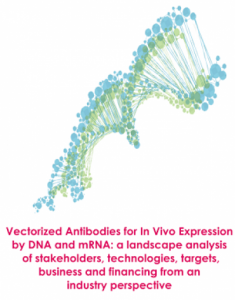Vectors delivering antibodies for in vivo are offering robust market for biotechnology companies
The new report evaluates the industry landscape of antibody vectorization with optimized technologies for direct in vivo delivery.
However, there exist a number of limitations and challenges for passive immunotherapy, such as costly and time-consuming manufacturing, inconvenient administration protocols, a relatively short half leading to the need for repeated administration in case of chronic therapy. The blood-brain barrier (BBB) is a special concern for recombinant antibody therapy. The BBB prevents antibody entry to the central nervous system (CNS). Furthermore, antibodies do not enter the intracellular proteome. Systemically administered recombinant antibodies also have a potential for unspecific or toxic off-target effects.
The Antibody vectorization intends to overcome such limitations of conventional passive immunotherapy.
Inquire about this report: https://www.marketresearchreports.com/la-merie-publishing/vectorized-antibodies-vivo-expression-dna-and-mrna-landscape-analysis
Each of the three different antibody vectorization approaches
1. Adenoassociated virus (AAV) vector for delivery of DNA: AAV DNA;
2. Synthetic plasmid DNA utilizing an electroporation device to enhance transfection efficiency after IM delivery: plasmid DNA;
3. mRNA formulated in lipid nanoparticles (LNP): LNP mRNA.
for in vivo expression of antibodies has its specific profile of advantages and disadvantages.
The vast majority (around 70%) of vectorized antibody technology companies are US-based companies. Three of the five mRNA technology companies with in vivo expression of antibodies are located in Germany, AAV DNA company is based in The Netherlands and one plasmid DNA company is headquartered in France.
The three DNA vectorized antibody programs with AAV delivery of direct injection are in large ophthalmic disease indications such as wet age-related macular degeneration (AMD), diabetic retinopathy or diabetic macular edema. The two clinical-stage in vivo expressed antibody programs from Inovio and Moderna are for the treatment of infectious diseases: Zika virus infection and Chikungunya virus infection.
The clinically most advanced vectorized antibody programs are based on virally delivered DNA: Regenxbio and Adverum Biotechnologies have clinical phase III and II programs, respectively. Plasmid DNA technology with electrotransfection and electroporation, respectively, has enabled clinical stage II and I programs (Eyevensys and Inovio Pharmaceuticals). Only one mRNA encoded antibody for in vivo expression has reached the clinical stage I (Moderna Therapeutics).
The Vectorized Antibodies for In Vivo Expression by DNA and mRNA report provides a landscape analysis of stakeholders, technologies, targets, business, and financing from an industry perspective. The report also offers economic terms of collaboration and licensing deals.
For the latest biotechnology reports visit: https://www.marketresearchreports.com/biotechnology
For Tailor-made research services please visit: Custom Market Research
About Market Research Reports, Inc.
Market Research Reports® Inc. is the world's largest store offering quality market research, SWOT analysis, competitive intelligence, and industry reports. We help Fortune 500 to Start-Ups with the latest market research reports on global ®ional markets which comprise key industries, leading market players, new products, and the latest industry analysis & trends.
Sudeep Chakravarty
Market Research Reports Inc.
+1 302-703-9904
email us here
Visit us on social media:
Facebook
Twitter
LinkedIn
Legal Disclaimer:
EIN Presswire provides this news content "as is" without warranty of any kind. We do not accept any responsibility or liability for the accuracy, content, images, videos, licenses, completeness, legality, or reliability of the information contained in this article. If you have any complaints or copyright issues related to this article, kindly contact the author above.



